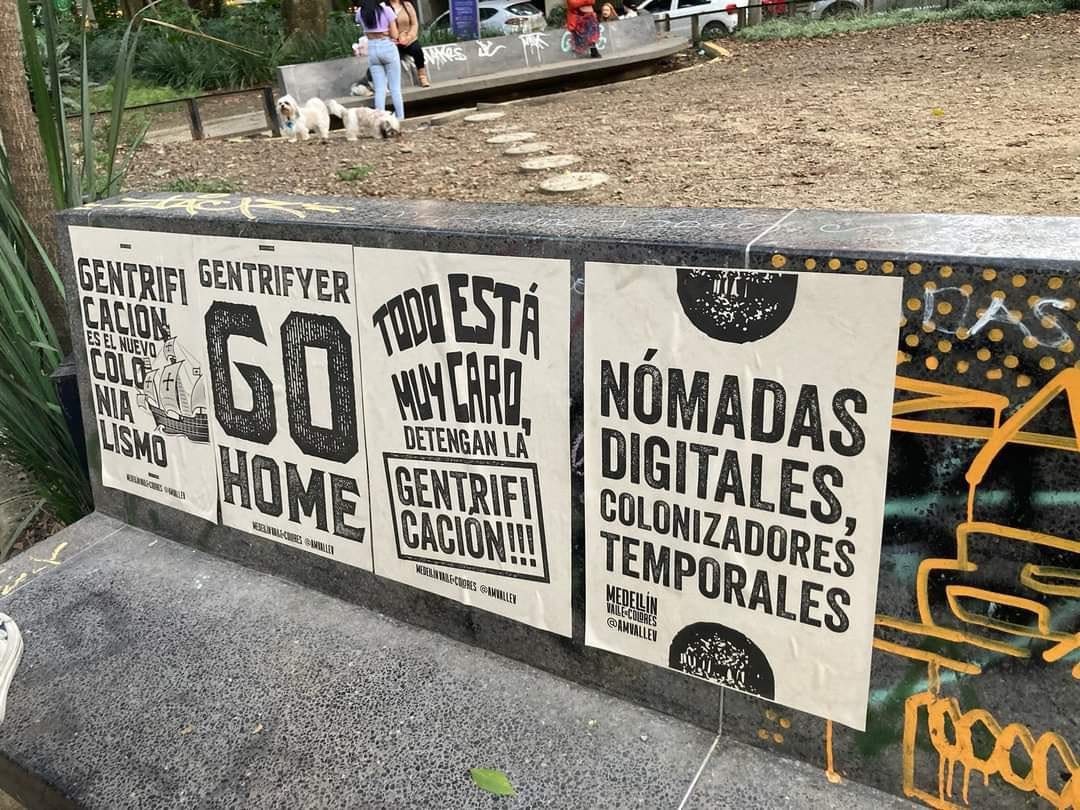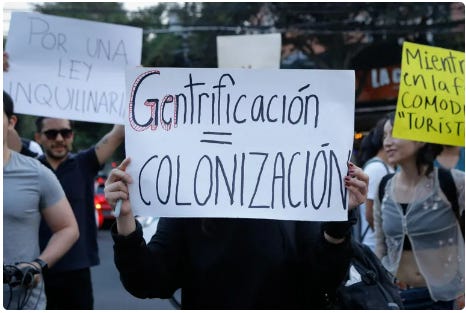Dear friends,
One of the first Mexican sayings I learned since moving here is credited to former president Porfirio Díaz: “Pobre México, tan lejos de Dios y tan cerca de Estados Unidos.”
Translated into English, “"Poor Mexico, so far from God and so close to the United States."
While you may have learned from the media and other sources that Mexico benefits greatly from its proximity to the US, that’s not the general perception of the Mexican people. You may be used to thinking of Mexicans dreaming of migrating to the US in search of the American dream, but the reality is more nuanced than that. In fact, they’re dealing with a situation you may not expect: an influx of Americans flooding their capital city for the last few years.
If you search the best places from which to work and live, Mexico, and specifically Mexico City, almost always comes out on top:
It’s affordable for most North Americans and Europeans
It has a mild and dry climate—the high was 75 yesterday! in August!!
The food scene is amazing, and it’s chiles en nogada season :)
It has a strong infrastructure with fast and reliable internet
It’s completely walkable and relatively safe
They offer a temporary residence visa for digital nomads
If you haven’t heard the term “digital nomad,” it’s used to describe a person who has the ability to work online and can, thus, live anywhere…or nowhere and move around at will from Airbnb to Airbnb. Typically, digital nomads stay anywhere from a few months to a year or more before moving on to a new location. The digital nomad lifestyle became quite popular during the pandemic, and for many people it continues to be a way of life post-pandemic.
Part of the appeal is what is known as “geoarbitrage – earning money in a strong currency and then living in a country where the local currency is weaker and the cost of living lower.” Of course, “passport privilege” for Americans and Europeans makes the digital nomad lifestyle possible. In Mexico, someone with a US passport can stay for up to 180 days without a visa. That’s almost half a year!
In Mexico City, digital nomads are seemingly everywhere. You can hear English spoken just as much as Spanish in the popular neighborhoods of Roma, La Condesa, and Polanco, where foreigners tend to live and work. Cafes and restaurants offer menus in both English and Spanish to cater to them; they can rent homes remodeled with western-style amenities; and, all the while, they can feel good about the economic benefits they bring as a foreigner with far more money than most locals.
I have met lovely digital nomads in the city—Americans who are eager to learn Spanish; who respect the culture and its people; who come with a learning posture; who see the injustice of immigration policies in the US; and who are aware of their privilege. Above all, good nomads interrogate the unequal conditions in the world that allow them to be nomads or “expats” living abroad while others are denied entry to the US or Europe even for just a short, tourist visit.
Digital Nomads: Destroyers of Worlds
But as you might have guessed, there is a dark side to the digital nomad:

In some of these historic neighborhoods in Mexico City, rent has increased as much as 60% in the last 3 years, compared to 30% overall across other parts of the city. This steep increase has priced out many of the Mexicans who used to live there. While many Mexicans are very welcoming to digital nomads, their presence is creating displacement and changing the face of the neighborhoods. Suddenly, little coffee shops are full of mostly white working nomads on business calls (that are much louder than they think), rather than the neighborhood people who used to come to drink coffee and spend time together. Not to mention the nomads who brag about how far their dollars go in the city in front of Mexican people who are not earning dollars and can’t afford the same lifestyle. This is a huge, and mostly unwelcome, shift.
Movement for All
If you’re thinking that I’m going to discourage Americans and others from coming to Mexico City, you would be wrong. It’s the job of the Mexican government to make sure housing remains affordable for its citizens—it’s not the responsibility of digital nomads. I believe in the freedom of movement…for all people not just Americans.
Movement is natural. People have migrated whenever they have had an open land and the right to move and even when they haven’t. After my parents received the right to permanent legal residency in the US, they chose to leave our home in Southern California in search of a place where property prices were more affordable. They did not call it “migration” because that is not how people typically refer to movement when it occurs within a country, but we migrated from the West to the East Coast. We arrived just after the Mariel boatlift that brought thousands of Cuban refugees to South Florida.
Science journalist Sonia Shah says that it is easy enough for us to be lulled into the false perception that immigrant movement is the exception to the rule—that what is normal is to stay in one place. She adds, “But life is on the move, today as in the past. For centuries, we’ve suppressed the fact of the migration instinct, demonizing it as a harbinger of terror. We’ve constructed a story about our past, our bodies, and the natural world in which migration is the anomaly. It’s an illusion. And once it falls, the entire world shifts.”1
Today, more people than ever live outside of their country of origin and do so for varied reasons. The twenty-first century has been dubbed “the age of migration,” since immigrants make up 3 percent of the world’s population.2 While that number sounds small, it represents 244 million people. Were they to gather in one place, they would make up the world’s fifth most populous nation. What is unnatural, then, is not movement or migration but the restriction or prevention of movement.
And that’s precisely the beef I have with the US immigration system—it suppresses a natural instinct to move in search of…anything. It could be a better life; it could be a season of adventure; or perhaps to be a tourist…yet the expectation is that other countries will welcome their own citizens with open arms.
I’ve met Mexicans who would love to go to the US for a time, to be digital nomads themselves—these are professionals with jobs and homes and lives here in Mexico, yet most of them have not been able to get a visa to enter the US. The freedom of movement should be for all of us, not just a privileged few who happened to hit the citizenship jackpot by being born in the US, Canada or Europe. I suppose that Mexico could respond by having equally restrictive immigration policies, but why can’t the US respond with equally generous ones?
I wonder how the US would respond if Mexico treated its citizens who’ve migrated to Mexico with the same suspicion and disdain with which the US treats Mexican migrants? Why is the natural right to move only for some and not for all? Why can’t we have reciprocal immigration policies when Mexican migrants have historically contributed so much to the US?
By the way, when I talk to digital nomads here in Mexico, they almost always say they came here for a better quality of life. Sound familiar? That’s exactly why lots of people move to the US, too.
Sonia Shah, The Next Great Migration: The Beauty and Terror of Life on the Move (New York: Bloomsbury, 2020), 30-31.
Gemma Tulud Cruz, “When No Land on Earth Is ‘Promised Land’: Empire and Forced Migrants,” in People and Land: Decolonizing Theologies, ed. Jione Havea (Lanham, MD: Fortress Academic, 2020), 35.






What great, thought provoking questions. I have friends, US citizens, who have moved to Panama but had considered areas outside of Mexico City. Everything you said resonated with me. Americans need to do some deep soul searching & re-examine their perseptions of immigrants.
You know I love this! People migrate, has been my rallying cry for my work for awhile and migration (whether temporary or permeant) impacts all sectors of life, climate, economy, policy, culture ect. I just finished the Sonia Shah book too and am now really interested in the study of diaspora and how community and cultural life is impacted by migration. Thanks for these good thoughts.